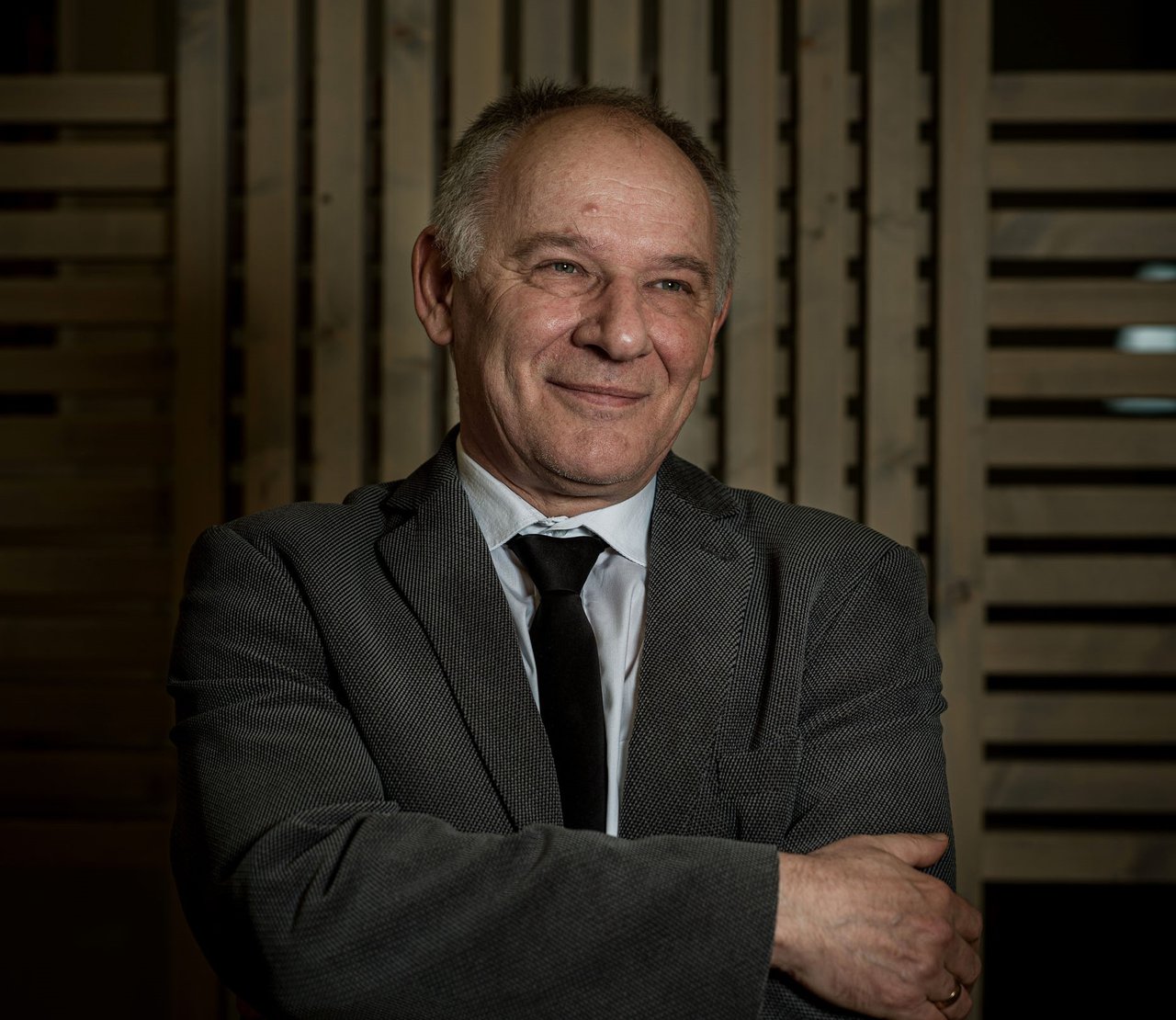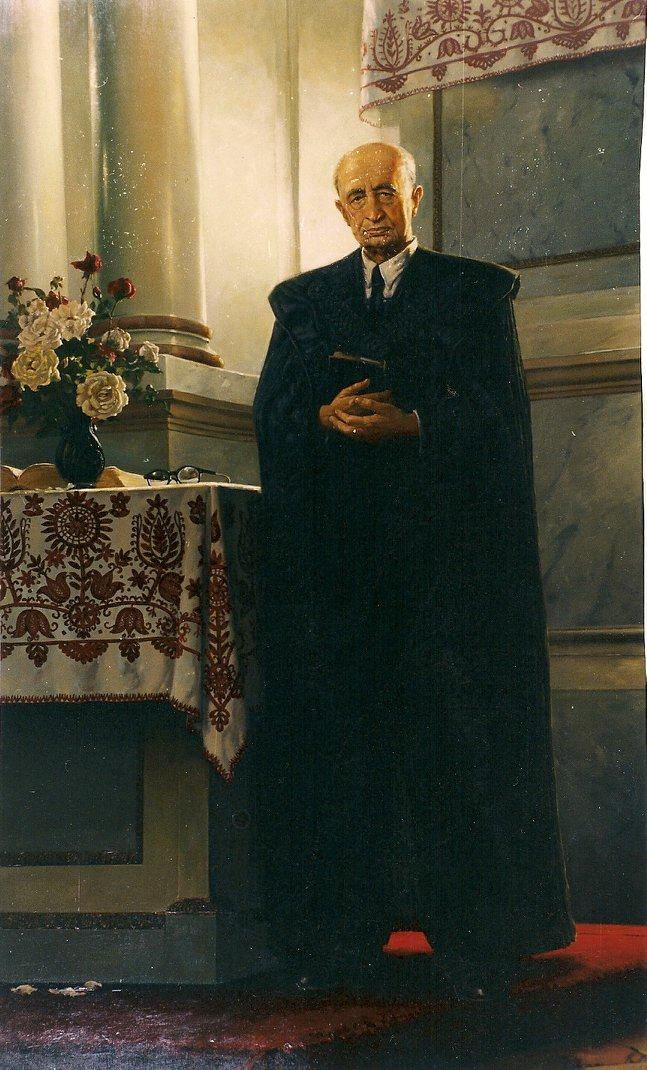The spirit of László Ravasz as well as the results of his building and development work are just as much alive today as the painful wound caused by a mistake he made. We sat down to talk to István Bogárdi Szabó, former Bishop of the Danubian Reformed Church District, about one of the most outstanding members of the “great generation of his predecessors”.

Bishop István Bogárdi Szabó. "We look upwards, to the Lord of History, who is also the Lord of the Church."
During the interwar years, László Ravasz was engaged in significant church development activities. Can we draw any conclusions from this fact that are still relevant and applicable today?
Practically speaking everything that we have gained from Bishop Ravasz’s church development work is still here with us. This is so because the life of a church does not change as quickly as it may seem from the outside. What is more, Ravasz always relied on theological foundations when determining priorities in any given time and situation. In his view, the life of the church is rooted in preaching and administering the sacraments, and he strived to elevate pastoral ministry to this level. In one of his writings he said that the Reformed Church was squandering souls when insisting on having pastors, assistant pastors and teachers in depopulated congregations, despite the lack of parishioners. On the other hand there are giant congregations where the pastor is forced to take on the role of a manager, and can no longer devote time to what they were originally appointed to do: to be the shepherd of the congregation. Today, we are still struggling with the troubles of squandering souls. Another direct consequence of Ravasz’s view of the church is that not only does the church have a duty to establish and maintain, but it should also always be characterized by growth in faith, strengthening in hope and expanding the works of love. His time as bishop was paradoxical: he started his church governing work in the Danubian Reformed Church District when growth was thwarted by historical and societal circumstances. He began his work after the Treaty of Trianon, the only recently united and uniformed Reformed church had fallen apart, several congregations became impoverished, and totalitarian world views emerged. His generation launched a series of issues that are still influential today, and László Ravasz was a leading figure in this great work as well. He was able to inspire many. We tend to overlook, when thinking of him, that he was an inspirational character. Doubtless, this stemmed from his unique personality, which turned out to be a great gift for us.
You mentioned taking care of pastors. László Ravasz was among the first to suggest that pastors themselves should be the recipients of pastoral care.
This idea also stemmed from his view of the church. He was, however, not the first with regard to the pastoral care of pastors; what he did was execute a kind of revision. Ravasz writes in his autobiography that in 1909, which was a Calvin Memorial Year, he read a lot of works by and about Calvin, and discovered that in Calvin’s lifetime there was a society of pastors in Geneva, which was the primary scene of caring for pastors in the 16th century. Between the two world wars, László Ravasz devoted a lot of effort to organise societies of pastors in the Danubian Reformed Church District. If a pastor lives in isolation, i.e., he or she is locked into their own congregation and lacks a collegial and friendly community of peers, then even the best of professional pastoral care can only achieve limited success. Ravasz was willing to look to the past for such a system and make it flourish in his own time.

László Gulyás: Full-length portrait of Bishop László Ravasz
László Ravasz voted in favour of the first two anti-Jewish laws, but later went on to be one of the most outspoken defenders of the Jewish community. How can we evaluate his actions today?
This is a painful wound and a really tough question. In light of the extension of the persecution of Jews and the horrible reality of the Holocaust he had a completely different view of the anti-Jewish laws, the first two of which he had indeed voted in favour of. And he admitted doing so, with true repentance. He did not try to explain away the circumstances in which he had to realise that the issue at hand was not about justice. He did not try to minimize his behaviour by pointing to the fact that later, but unfortunately only later, he did do the right thing. He had to confront the fact that inadvertently he opened up the way for the terrible race concept of a totalitarian world power. This is a warning sign for our generation that we must stay vigilant because it is easy to be carried away by enormous societal movements even while doing wonderful development work, among relatively good circumstances and surrounded by great people. I sincerely hope that this wound has healed, but we must never forget about it.
When the Communists took over, László Ravasz was forced to resign. Why did his fate turn out different from that of others, such as Cardinal Mindszenty?
Well, we could pose the question, what do we mean by different fates? The way I see it, they all had the same fate, albeit in different forms. Mindszenty’s fate led him to prison, then after his freeing in 1956 to isolation, and finally, to forced emigration. László Ravasz ended up in solitude in Leányfalu, where he lived out the rest of his life surrounded by secret agents. Lutheran Bishop Lajos Ordass ended up in prison, and after 1956, in complete isolation. They hardly had any choice in their fate. They did what they could. Mindszenty resisted, was put in prison and became the victim of a show trial. László Ravasz, on the other hand, decided to be wise, rather than courageous, as he himself put it, and he stepped aside. By this time he was a widower, old and tired, plagued by serious illnesses, so he weighed up his power and realised that he could not fight any more. My parents’ generation considered László Ravasz to be just as much a marginalized victim of Communist church persecution as they did Mindszenty. Reading the Letter to the Hebrews in the Bible, one can see that hardly any two heroes of faith had the same fate. And we all know that the methodology of Communist church persecution was to have a variety of ways to destroy people. If we talk about fate, we can say that they shared in the fate of the church, which was taking away one’s voice and opportunities.
In your own career as bishop, what legacy did you inherit or take over from László Ravasz?
A second-rate student should not lay claim to the great generation of his predecessors. Having said that, I strived to adopt the sophisticated attitude of Ravasz that people should be put to work according to their God-given talents. Accordingly, I did my best to discover the God-given talents of colleagues, pastors, elders, congregation employees, teachers and diaconal workers, trying to open up the way for these talents to flourish. Not only did Ravasz have his own natural talents, but he was also able to nurture the talents of others. He was looking for divine gifts in the servants of the church. Therefore he did not raise himself to heights that were inaccessible to others, but instead, appreciated and supported not just dignitaries, but everyone, be it a talented elementary school teacher or a well-spoken assistant pastor. Even more importantly, when he finished his ministry as bishop, his parting message for his peers was the following: inwards and upwards. What truly matters can be found in the dimensions of faith, hope and love. So “inwards” did not mean that we should lock the doors because we have nowhere to go, but that we must never let go of what really matters, even in the most difficult moments of history. “Upwards”, in turn, refers to his view of history. We look upwards, to the Lord of History, who is also the Lord of the Church. When evaluating the difficult times, he concludes: I believe in grace. This conclusion is the essence of “upwards”.
If you received a phone call tomorrow that a school was to be named after László Ravasz and they needed a motto to put on the wall opposite the entrance, what would you say?
This question requires careful consideration, as the Bible is full of wonderful passages, and László Ravasz preached about nearly all parts of the Bible. But let us say it should be the Alpha and the Omega. Ravasz had a deep faith in Jesus Christ, and was able to express his faith beautifully. He was able to express, among other things, that in the end all that matters is being faithful to Christ. However, we can only truly live in faith and from faith if we know that the basis of our being faithful to Christ is not based on us, but our faithful Redeemer, who is the Alpha and the Omega himself. This is what I would write on the wall, even if today these two Greek letters require some explanation. But Jesus himself explained this in Revelation: “I am the Alpha and the Omega…who is, and who was, and who is to come…” (Rev 1:8). He is the beginning, as well as the joyful ending of all things.
Originally published in Reformátusok Lapja, the Weekly of RCH. Translated by Erzsébet Bölcskei
Even Bishops Are Humans
„During those festive days, László Ravasz became the most popular person in Budapest: he was suddenly fashionable. Not for his personality, but for the great and holy interests that he represents so splendidly."